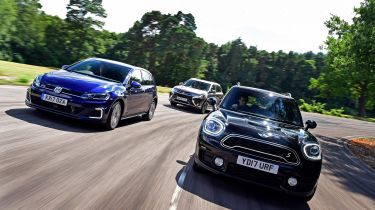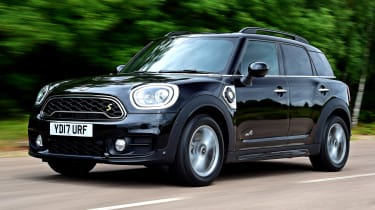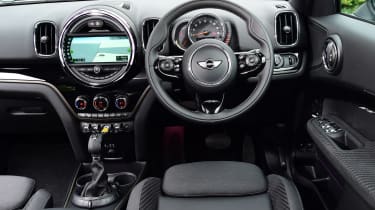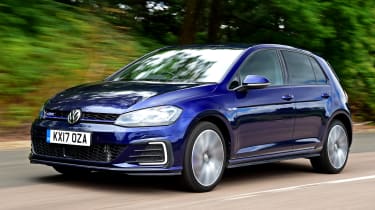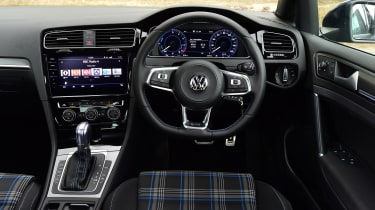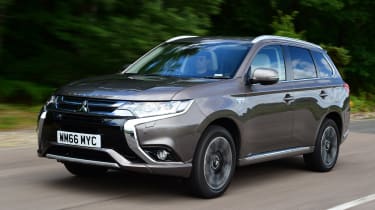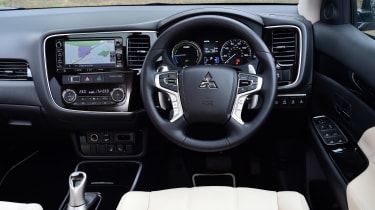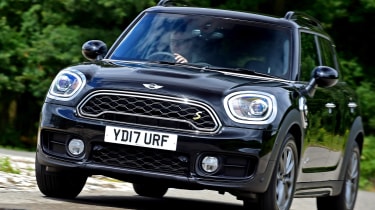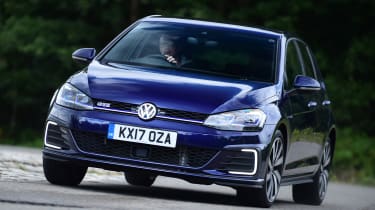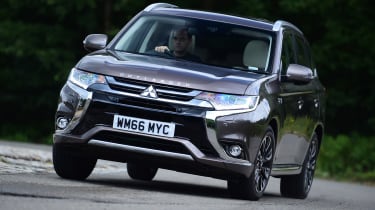MINI Countryman S E vs VW Golf GTE vs Mitsubishi Outlander PHEV
The all-new MINI Countryman S E plug-in hybrid squares up to the Volkswagen Golf GTE and Mitsubishi Outlander PHEV
The automotive industry is changing faster now than it has for decades. More people are waking up to the virtues of plug-in hybrid vehicles, so manufacturers are ramping up investment in the technology.
MINI is the latest car maker to surf that wave. Sister brand BMW already offers a range of plug-in hybrids, and MINI has inherited this tech for its first petrol-electric production model, the new Countryman S E.
It combines low running costs with decent performance in a practical off-roader body, but it has a tough job on its hands going up against our favourite plug-in hybrid family car, the Volkswagen Golf GTE. The VW may not possess the MINI’s rugged looks, but it has quality, sharp handling and efficiency.
• Best plug-in hybrid cars on sale
However, both will have to overcome the challenge from Britain’s favourite plug-in hybrid, the Mitsubishi Outlander PHEV.
The Japanese car is a bigger SUV than the MINI and a completely different body style from the Golf, but all three cars claim to offer practicality and parsimonious running costs. Which is the most convincing?
MINI Countryman S E
| Model: | MINI Countryman Cooper S E ALL4 |
| Price: | £29,075 |
| Engine: | 1.5-litre 3cyl turbo/e-motor, 221bhp |
| 0-60mph: | 6.4 seconds |
| Test economy: | 45.1mpg/9.9mpl |
| CO2: | 45g/km |
| Annual road tax: | £130 |
The Countryman S E is MINI’s first plug-in hybrid. With a 134bhp 1.5-litre three-cylinder petrol engine mated to an 87bhp electric motor, the £29,075 S E ALL4 offers surprising pace, all-wheel drive and impressive claims of up to 134.5mpg. Can it deliver on its on-paper promises?
Used - available now

2020 Mini
Countryman
23,340 milesAutomaticPetrol2.0L
Cash £23,729
2022 Mini
Countryman
27,026 milesAutomaticPetrol2.0L
Cash £24,087
2020 Mini
Countryman
46,158 milesAutomaticPetrol1.5L
Cash £16,263
2018 Mini
Countryman
42,704 milesAutomaticPetrol1.5L
Cash £15,600The Countryman S E might be heavier than conventionally powered models, but it retains that sense of fun that has been a MINI trait for years. Still, that 1,735kg kerbweight means the MINI isn’t as agile as the Golf.
The steering is quick and with plenty of grip turn-in is positive – plus the electric four-wheel-drive system gives good traction and you can feel the subtle boost from the motor under full throttle.
On test the Countryman served up an impressive 0-60mph time, taking just 6.4 seconds to cover the sprint. It’s helped by the automatic transmission that shifts smoothly and contributes to the overall relaxing experience on the move.
In gear, the instant torque from the electric motor gave excellent response as the MINI accelerated between 30 and 50mph in fourth in 3.1 seconds, while there’s plenty of urge to roll along in EV mode.
You get some three-cylinder thrum from under the bonnet when the engine kicks in, but the car is relatively refined at speed. However, the chassis has been stiffened to cope with the extra weight of the battery pack, so the Countryman doesn’t float over bumps with as much composure as the regular car.
Push harder and the extra weight is noticeable through the looser body control as the dampers struggle to control the mass. It’s a fair match for the Golf, however, and is far more composed and fun than the Outlander. You can also tweak the drive modes for extra efficiency or a sportier feel; the latter adds weight to the steering, but the default mode is best. An area where the Countryman scores well is its brakes. Pedal feel on these regenerative set-ups can be vague, and although the MINI isn’t perfect, it’s one of the better ones we’ve tested.
Testers’ notes: “The way the Countryman combines its petrol and electric propulsion is slick. It’s a convincing plug-in hybrid that doesn’t demand too many compromises.”
Volkswagen Golf GTE
| Model: | Volkswagen Golf GTE Advance |
| Price: | £29,635 |
| Engine: | 1.4-litre 4cyl turbo/e-motor, 201bhp |
| 0-60mph: | 6.8 seconds |
| Test economy: | 47.3mpg/10.4mpl |
| CO2: | 40g/km |
| Annual road tax: | £130 |
Recently facelifted for 2017, the VW Golf remains the only car on sale in the United Kingdom offered with petrol, diesel, full electric and hybrid powertrains. Here we test the £29,635 plug-in hybrid Golf GTE in Advance form, which costs £560 more than the MINI but is £2,170 cheaper than the Outlander. Can it convert that into victory?
The GTE sits at the sportier end of the plug-in market, combining GTI performance with even lower running costs than the Golf GTD. However, it doesn’t drive with quite the same verve as those cars, but it’s closely matched with the MINI and more enjoyable than the Outlander.
The suspension has been tweaked and is stiffer to cope with the weight of the battery pack mounted underneath the boot. To give an idea of how much this weighs, the GTE is 250kg heavier than a GTI. It doesn’t change direction as sharply as other Golfs as a result, but it’s more alert and agile than the MINI, helped by its lower centre of gravity, while the Outlander simply can’t compete.
The GTE shares the Countryman’s accurate steering and while grip is good, the Golf sometimes does struggle for traction due to its front-wheel drive set-up. However, this is only when driving faster, and as the GTE has that capability, it’s more evident but certainly not a problem day to day.
On test the Golf sprinted from 0-60mph in 6.8 seconds, trailing the MINI by four tenths. The less powerful GTE was also slower in gear than the Countryman, although it only trailed the MINI by two tenths from 30-70mph through the gears. The DSG box shifts quickly, but it can sometimes be a bit clunky when coming to a stop. It’s not the only flaw.
The firmer set-up also means the GTE suffers in terms of ride quality compared with more normal Golfs. However, it’s no worse than the MINI here, and although both these cars are on the firmer side, the damping is plusher than the Mitsubishi’s, which tends to crash over imperfections. Apart from the firmer edge to the ride, the GTE is refined. There’s some road noise, but it’s no worse than in the MINI, while the engine isn’t as coarse as the Outlander’s when revved.
Testers’ notes: “GTE gets five driving modes, including e-mode, hybrid, battery charge and GTE. Being able to charge the battery on the move is useful, while GTE is for max performance.”
Mitsubishi Outlander PHEV
| Model: | Mitsubishi Outlander PHEV Kotu |
| Price: | £31,805 |
| Engine: | 2.0-litre 4cyl/2 e-motors, 200bhp |
| 0-60mph: | 9.0 seconds |
| Test economy: | 39.2mpg/8.6mpl |
| CO2: | 42g/km |
| Annual road tax: | £130 |
The Outlander PHEV has proved a real sales success. When it launched, price parity with the diesel model and attractively low running costs ensured the Mitsubishi became Britain’s best-selling plug-in hybrid. Although our pictures show a top-spec 5hs, it’s the £31,805 Kotu model we test to see if it still has what it takes against newer rivals.
The Outlander PHEV’s powertrain operates in a narrower window than either of its rivals. Due to the car’s 1,845kg kerbweight the 2.0-litre petrol engine feels strained, while the boost from the battery and electric motors isn’t as noticeable.
The single-speed CVT automatic gearbox isn’t as responsive as the transmissions in its competitors, either. This setup meant we couldn’t record any in-gear times, but the Outlander accelerated from 0-60mph in 9.0 seconds.
As well as being the slowest car, it’s also the worst dynamically. The high centre of gravity and slow steering mean it doesn’t handle as sweetly as the VW or MINI, and it doesn’t deliver as much comfort.
The chassis isn’t as well set up because the car isn’t as composed as its rivals over bumps. Although all three cars are on the stiff side, the Outlander doesn’t have the sophistication when it comes to ride quality, and combined with its relative lack of refinement on the move, it means the Mitsubishi is more taxing over longer journeys.
Once the battery has been depleted the naturally aspirated engine doesn’t feel as punchy as its turbocharged rivals, while the fuel economy dips further due to the heavier body. It means the Mitsubishi is more out of its comfort zone on the motorway, but if you can keep the battery topped up, it makes more sense around town.
Testers’ notes: “Despite the Outlander’s size, it’s only rated to tow up to 1,500kg – the same as the Golf GTE. The MINI isn’t designed to pull anything, so bear this in mind if you tow a trailer.”
Verdict
First place: MINI Countryman S E
The Countryman Cooper S E combines petrol and electric power in seamless fashion and with the least compromise. It does suffer a little for comfort but is still fun to drive, while it’s also more practical than the GTE. Factor in MINI’s attractive finance deals, as well as its strong performance and impressively low running costs, and it’s easy to see why it’s our favourite family plug-in.
Second place: Volkswagen Golf GTE
VW’s Golf GTE is still a solid family-friendly plug-in hybrid. However, more expensive PCP deals for this GTE Advance model, plus a bigger drawback when it comes to practicality compared with the MINI, see it finish second. It’s fun to drive and offers a great blend of performance and efficiency, but its flaws are more apparent day to day.
Third place: Mitsubishi Outlander PHEV
Despite the Outlander’s popularity, the PHEV’s tech now feels dated compared with newer rivals’. From the powertrain to the infotainment, it’s not as advanced, while pricey PCP deals make its higher-quality, faster and comfier competitors look like much better value. It’s a marginally more practical option, but doesn’t offer as broad a range of operation as the MINI.
Is it worth waiting for this model?
Kia Niro Plug-in Hybrid
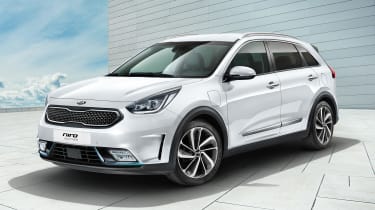
Due: late 2017Price: £29,500 (est)Engine: 1.6-litre 4cyl hybrid, 139bhp
Kia is aiming for CO2 emissions of less than 30g/km with an electric range of more than 34 miles for the new Niro Plug-in Hybrid. With only 139bhp it might not be as quick as the MINI, but the 324-litre boot should be practical.
Figures
| MINI Countryman Cooper S E ALL4 | Volkswagen Golf GTE Advance | Mitsubishi Outlander Kotu | |
| On the road price/total as tested | £29,075/£39,340 | £29,635/£31,675 | £31,805/£31,805 |
| Residual value (after 3yrs/36,000) | £12,613/43.4% | £14,334/48.4% | £12,840/40.4% |
| Depreciation | £16,462 | £15,301 | £18,965 |
| Annual tax liability std/higher rate | £522/£1,045 | £532/£1,065 | £572/£1,143 |
| Annual fuel cost (12k/20k miles) | £1,386/£2,310 | £1,322/£2,203 | 1,595/£2,658 |
| Ins. group/quote/road tax cost | 26/£602/£130 | 26/£548/£130 | 24/£983/£130 |
| Cost of 1st/2nd/3rd service | £299 (3yrs) | £288 (2yrs) | £525 (3yrs/37,500) |
| Length/wheelbase | 4,299/2,670mm | 4,270/2,631mm | 4,695/2,670mm |
| Height/width | 1,559/1,822mm | 1,457/1,799mm | 1,710/1,800mm |
| Engine | 3cyl in-line/1,499cc | 4cyl in-line/1,395cc | 4cyl in-line/1,998cc |
| E-motor power/battery | 65kW/6.1kWh Li-Ion | 75kW/8.7kWh Li-Ion | 50kW/12kWh Li-ion |
| Peak power/revs | 221/4,400 bhp/rpm | 201/5,000 bhp/rpm | 200/4,500 bhp/rpm |
| Peak torque/revs | 385/1,250 Nm/rpm | 350/1,500 Nm/rpm | 190/4,500 Nm/rpm |
| Transmission | 6-spd auto/e-4wd | 6-spd DSG/fwd | Single-speed auto/4wd |
| Fuel tank capacity/spare wheel | 36 litres/runflats | 40 litres/foam | 45 litres/foam |
| Boot capacity (seats up/down) | 405/1,275 litres | 272/1,162 litres | 463/1,691 litres |
| Kerbweight/payload/towing weight | 1,735/610/N/Akg | 1,615/500/1,500kg | 1,845/495/1,500kg |
| Turning circle/drag coefficient | 11.4 metres/N/A | 10.9 metres/N/A | 10.6 metres/N/A |
| Basic warranty/recovery | yrs(unlimited)/1yr | 3yrs (60,000)/1yr | 5yrs (62,500)/3yrs |
| Service intervals/UK dealers | Variable/148 | Variable/223 | 12,500 miles (1yr)/125 |
| Driver Power manufacturer/dealer pos | 8th/21st | 14th/28th | N/A/30th |
| NCAP: Adult/child/ped./assist/stars | 90/80/64/51/5 | 94/89/65/71/5 | 88/84/64/81/5 |
| 0-60/30-70mph | 6.4/5.6secs | 6.8/5.8secs | 9.0/8.7secs |
| 30-50mph in 3rd/4th | 2.5/3.1secs | 2.9/4.1secs | 3.7secs (in kickdown) |
| 50-70mph in 5th/6th | 4.2/6.2secs | 5.8/7.3secs | 5.6secs (in kickdown) |
| Top speed/rpm at 70mph | 123mph/ N/A | 138mph/2,250rpm | 106mph/ N/A |
| Braking 70-0/60-0/30-0mph | 51.8/33.9/11.1m | 44.9/39.1/8.5m | 52.9/38.9/11.0m |
| Auto Express economy/range | 45.1/357 | 47.3/416 | 39.2/388 |
| Govt combined | 134.5mpg | 156.9mpg | 156.9mpg |
| Govt combined | 29.6mpl | 34.5mpl | 34.5mpl |
| Actual/claimed CO2/tax bracket | 145/49g/km/9% | 138/40g/km/9% | 166/42g/km/9% |
| Noise outside/idle/30/70mph | 73/45/69/71 dB | 62/38/65/71 dB | 68/48/68/69 dB |
| Airbags/Isofix/parking sensors/camera | Eight/yes/yes/£310 | Seven/yes/yes/£265 | Seven/yes/yes/no |
| Auto/stability/cruise control/AEB | Yes/yes/yes/yes | Yes/yes/yes/yes | Yes/yes/yes/yes |
| Climate ctrl/leather/heated seats | £460/£1,550/£270 | Yes/£1,750/yes | Yes/£1,500/no |
| Met paint/LED lights/keyless go | £550/£1,100/£350 | £570/yes/£365 | £550/no/yes |
| Sat-nav/USB/DAB/Bluetooth | Yes/yes/yes/yes | Yes/yes/yes/yes | Yes/yes/yes/yes |
